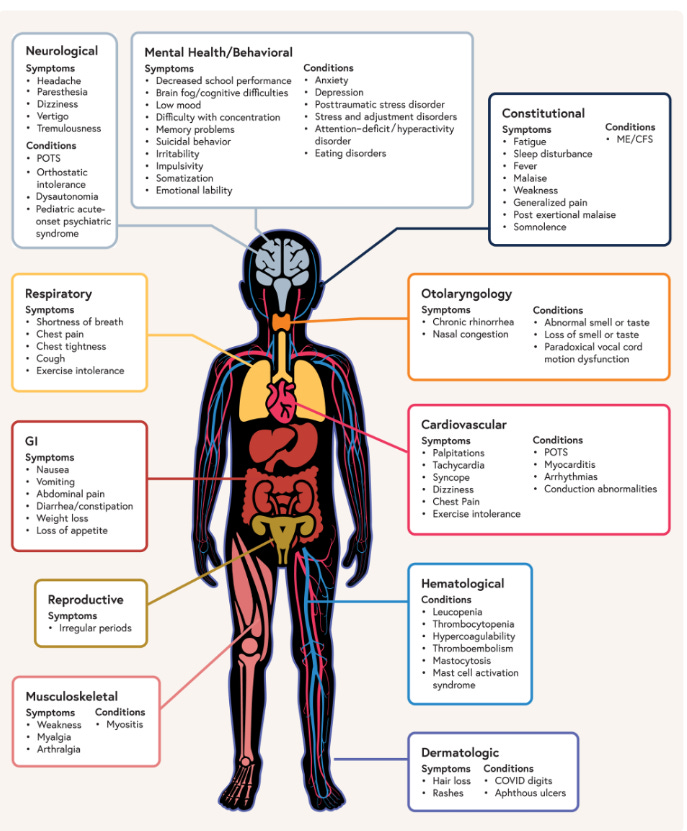What is the latest research regarding children under age 18 and Long Covid?
Children under 18 are impacted by long COVID and experience many different symptoms that can affect their lives.
Those Nerdy Girls deeply appreciates all of our Substack subscribers. We are especially grateful to our paid subscribers who support the sustainability of our work.
As a thank you for your generous support, all new annual subscribers between now and October 14th will receive a 20% discount for the first year.
Please consider supporting us with your paid subscription. It means so much to us to have you as a valued community member!
Q: What is the latest research regarding children under age 18 and Long Covid?
A: Children under 18 are impacted by long COVID and experience many different symptoms that can affect their lives. Vaccines reduce the risk of developing long COVID, but we need more research into prevention and treatment for all age groups.
Long COVID, also known as post acute sequelae of COVID-19 (PASC), impacts adults and children under 18. There is a lot of debate happening right now related to the exact definition of long COVID. Every study and organization uses slightly different symptoms and definitions. For example, the NIH defines long COVID as new, ongoing, relapsing, or other health effects that last four weeks or more following a SARS-CoV-2 infection. On the other hand, the World Health Organization defines long COVID as the development of new or continuing symptoms three months after initial infection that last for at least two months without any other explanation. Different definitions like these make it very challenging to compare studies to each other and to know exactly how many adults or children are impacted by long COVID.
Do kids get Long COVID?
Despite these challenges there are many studies that demonstrate that children under 18 can be impacted by long COVID. However, due to the differences in study design and definitions,the percentage of children impacted ranges from 4 to 62%. However, most studies fall into the 10-20% range. Regardless of what study you use, the conclusion is the same - children are being impacted by long COVID. Research also shows that the symptoms can last years following infection and can greatly alter their quality of life.
What kinds of symptoms do children with long COVID experience?
The symptoms of long COVID vary a lot based on individual child, study and age group. Examples of symptoms include brain fog, fatigue, coughing, pain in muscles, joints, chest and/or stomach, headache, and mood changes. Long COVID is also associated with the development of subsequent autoimmune disease. A recent review created the graphic below to highlight how many organ and body systems can be involved.
It is also important to note that not every age group experiences the same type of symptoms. One recent study found that adolescents and school-aged children experience long COVID symptoms differently than each other. For example, school-aged children were more likely to have symptoms like brain fog, pain, and gastrointestinal symptoms. Adolescents were more likely to experience changes to taste and/or smell, pain, and fatigue.
In general, children with long COVID can experience many types of symptoms that can greatly impact their ability to play, learn, and experience life.
How can we prevent long COVID in children? Do vaccines help?
The best way to prevent long COVID is to avoid a SARS-CoV-2 infection. This has become increasingly difficult to do, but things like vaccines, masking, and improved indoor air quality can reduce the risk of infection.
We also have data from both adults and children that COVID-19 vaccination reduces the risk of long COVID. How much the risk is reduced varies a lot due to the differences in study design and long COVID definitions as highlighted above. One study found that COVID-19 vaccination was associated with a lower risk of long COVID diagnosis in children at 3, 6, and 12 months post infection. Another study found that vaccines were 41% effective at reducing the diagnosis of long COVID in children. But the study noted protection waned with time since the last dose, which supports the need for annual vaccines to help maintain this protection. A third study found similar results with vaccines reducing respiratory long COVID symptoms by 34-48% in children vaccinated.
While we do not know exactly how many kids are impacted, we do have enough data to know that children can and do develop long COVID and this can greatly impact their life. More research is needed to fully understand why some individuals develop it and how to better prevent and treat it.
ICYMI - Digest of Recent Posts:
Testing: FREE COVID-19 tests are available NOW!
Help Advance Science & Get Free At-Home COVID, Flu, and RSV Testing!
The City University of New York Institute for Implementation Science in Population Health (CUNY ISPH) is recruiting participants for an ongoing research study on respiratory infections. To learn more, watch a short video about the study.
If you or someone you know is interested in participating, simply email the study team at recruitprotects@sph.cuny.edu for a personalized link to the study recruitment form. Please put “Interested in CUNY Project PROTECTS - TNG” in the Subject line.
Reminder that we now have an online store filled with amazing nerdy merchandise.
Your purchases will help financially support the science communication mission of Those Nerdy Girls.
P.S. We’d love to see pics of you and your friends and family sporting their new TNG swag. You might even be featured in our shop! Email us your pics at info@dearpandemic.org
Like what you read? Please share it with others!
If you have a question, let us know!
We read every question and use them to inform our upcoming content, though we are unable to respond to each specific question.




